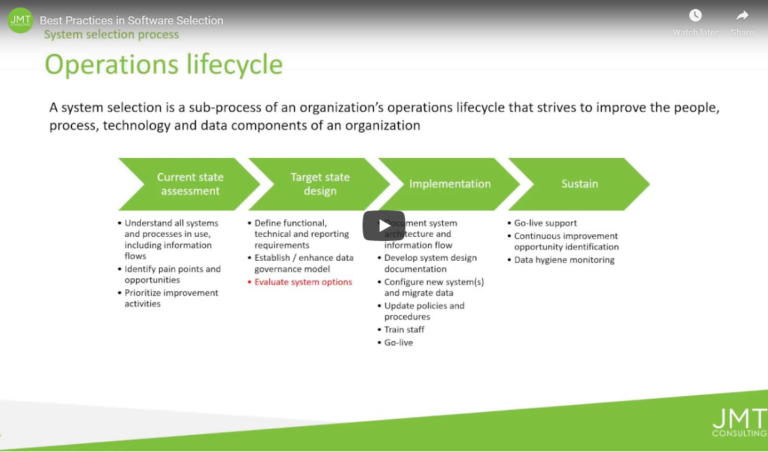Is your nonprofit scouting the arena of back-office systems in the pursuit of increased organizational efficiency and mission success?
In the world of software and technology, JMT is referred to as a “Value-Added Reseller” (“VAR”) of the products we represent. As in other industries, many software publishers choose to work with a network of partners like JMT to market, sell, and service their products. The idea from the publisher’s point of view is that they are in effect outsourcing these functions to partners who are more in tune and connected with specific markets, either geographic or (in our case) vertical. JMT specializes in working with nonprofit organizations, which is a “vertical market.” Some software companies sell exclusively through partner channels, some sell exclusively through a direct sales force, and others use a hybrid which combines some of both.
Regardless of the distribution method (direct, channel, or hybrid), the software companies have one goal: sell more software. Growth, profit, and product development are driven by the sale of the software. Professional services such as implementation and support, while certainly contributing to the bottom line, are of secondary importance to software companies. In some cases, not only are these services of secondary importance, but they are treated like “necessary evils” and impediments to the sale of new systems.
Software Implementations and Construction Projects
Here at JMT, we often use a construction analogy: software is like the building materials, but if the end goal is to build a new home, you need a contractor — you don’t go to the building materials store. JMT, we like to say, is your trusted contractor. We are constantly reviewing the building materials on the market and we only work with the best ones. However, even the best building materials are worthless if they are not expertly crafted together, following a thoughtfully assembled design plan.

While this is our belief, we recognize that many organizations approach us with the idea of buying software. They usually want to talk about features and functionality of the software and almost everybody wants the all-important software demonstration (“demo”). Few, if any, of our future clients initially put as much due diligence into the partner as they do the software itself. We understand why this is the case, and as we get to know the organization we help them to see the importance of the services and support offered by JMT. Usually, when an organization is ready to move forward with us, they are “buying” JMT as much as or more than they are buying the software itself.
Every organization, while certainly similar to others, is unique and requires a personalized setup and implementation of software tools. The most important part of our services is the planning stage, in which we sit down with our client and mutually decide upon the exact right setup (accounting dimensions, reporting groups, etc.) for that client’s reporting needs. Continuing with our construction analogy, we “measure twice and cut once.”
In today’s competitive software marketplace, we are seeing a disturbing trend of software companies pushing pre-packaged configurations and scopes of services. Potential buyers are enticed with heavily discounted pricing. For a nonprofit, this can be very difficult to resist. As noted in a previous blog post, Technology Matters to Nonprofits: The Impact of Falling Behind the Technology Curve, nonprofits understandably want to minimize the dollar spend on “overhead”. What the unsuspecting nonprofit doesn’t realize is that they will likely find after starting implementation that additional modules are required which were not included in the initial pricing, that the services are going to be inadequate and consist of things like packages of pre-recorded and non-personalized videos, and that the software company is going to dramatically increase pricing in future years. A software company was once attempting to recruit JMT into their partner channel and boasted about the low ball pricing for nonprofits. When JMT asked them how a partner like us could be profitable selling something for such cutthroat pricing, the executive of the software company said, “Upsell of course!” Needless to say, we declined the offer to partner with that publisher.
5 Things to Ask When Looking for New Software
- Ask the vendor for details about how the services will be performed. Onsite in your office or remote? Live or pre-recorded? Personalized configuration or pre-defined by the software company?
- Ask references if they had additional expenses that were not known to them at the time they signed the contract.
- Ask references if they felt the services were sufficiently thorough enough and how much of the software they feel they understand.
- Ask references if the promised timeframe for implementation was met.
- Ask the vendor for 5 references who had no additional costs beyond what was originally quoted.
In a marketplace where vendors are trying to find ways to make more profit by providing less value, JMT is proud to continue to put the “V” in “VAR”!
If you’re considering implementing new software at your nonprofit, we’d love the opportunity to learn more about your back-office needs and help find the best fit for you and your team. To chat with one of our nonprofit experts, contact us here.


